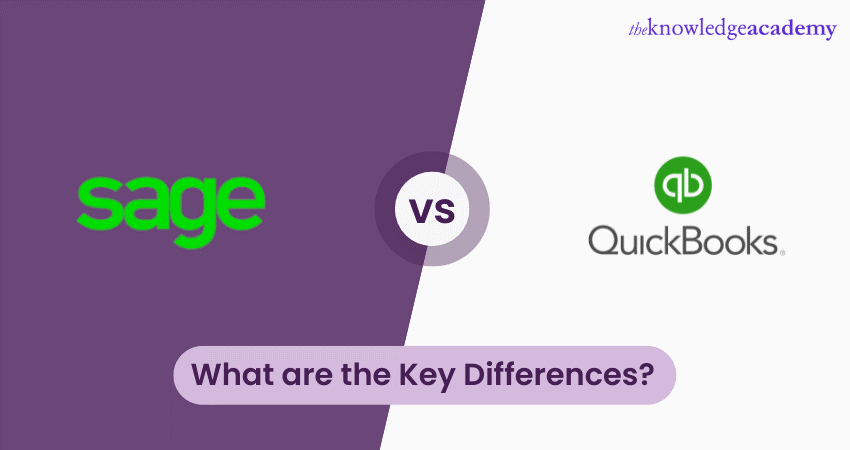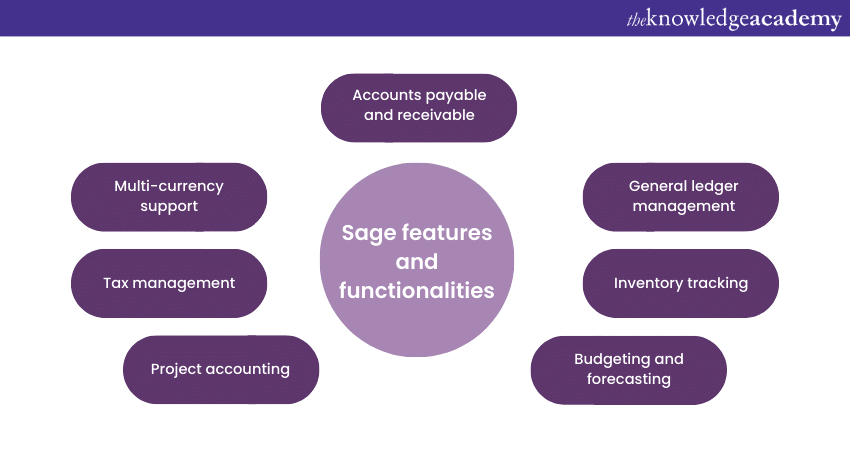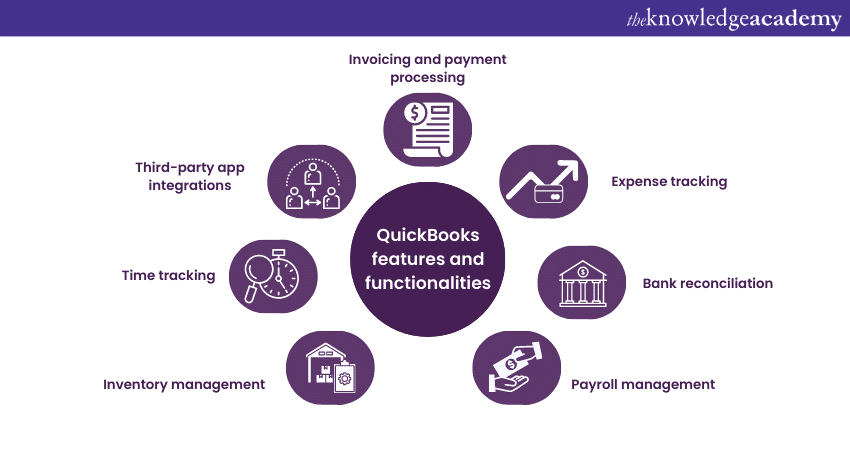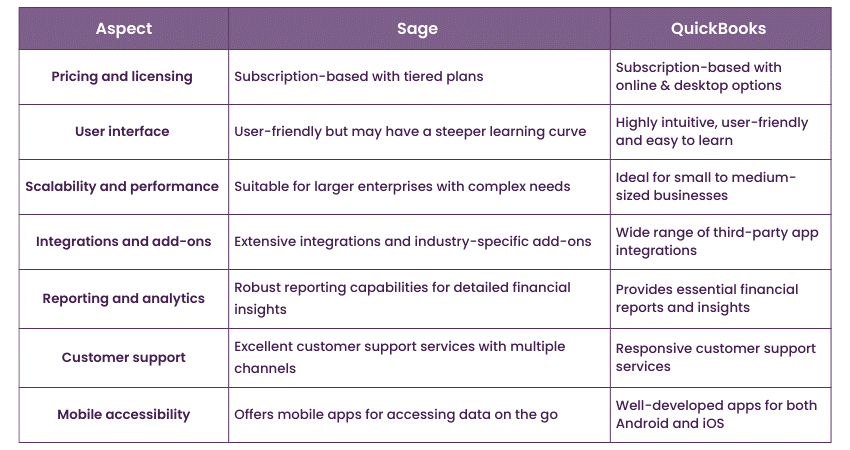We may not have the course you’re looking for. If you enquire or give us a call on 01344203999 and speak to our training experts, we may still be able to help with your training requirements.
We ensure quality, budget-alignment, and timely delivery by our expert instructors.

Amidst the plethora of modern-day accounting software, two names stand out: Sage and QuickBooks. Both are powerful tools designed to streamline financial management for businesses, but they have unique features and functionalities. In this blog, we'll expand on a detailed comparison of Sage vs QuickBooks, helping you make an informed decision for your business needs.
Table of Contents
1) What are Sage and QuickBooks?
2) Sage vs QuickBooks: Features and functionalities
3) Sage vs QuickBooks: Key differences
a) Pricing and licensing
b) User interface and ease of use
c) Scalability and performance
d) Integrations and add-ons
e) Reporting and analytics
f) Customer support
g) Mobile accessibility
h) Security and data protection
4) Which software should I choose?
5) Conclusion
What are Sage and QuickBooks?
Before we dive into the differences, let's understand what Sage and QuickBooks are. Both are accounting software solutions developed to help businesses manage their finances efficiently. Sage, developed by Sage Group, is a comprehensive suite of accounting and business management software. On the other hand, QuickBooks, a product of Intuit, is a user-friendly accounting software designed for small and medium-sized businesses.
Unlock your accounting potential with our QuickBooks Masterclass Course – sign up now!
Sage vs QuickBooks: Features and functionalities
When selecting the ideal accounting software for your business, understanding the QuickBooks Features and functionalities of each option is vital. Sage and QuickBooks offer many tools designed to simplify financial management, but they differ in their offerings. In this section, we will dive into a comprehensive comparison of the functionalities and features of Sage and QuickBooks.
Sage features and functionalities
Sage is a comprehensive accounting software that caters to businesses of all sizes, from startups to large enterprises. It hosts a wide array of features that cover various aspects of financial management.

1) Accounts payable and receivable: Sage provides robust tools for managing both accounts payable and accounts receivable. Users can efficiently handle vendor invoices, track payments, and manage customer invoices, streamlining the payment and collection processes.
2) General ledger management: The general ledger serves as the central repository for all financial transactions, and Sage excels in its management. Businesses can maintain accurate and up-to-date records of their financial activities.
3) Inventory tracking: It offers sophisticated inventory tracking capabilities for companies that deal with inventory. Users can monitor stock levels, track item movement, and generate detailed inventory reports.
4) Budgeting and forecasting: The software allows businesses to create budgets and forecasts to plan their financial activities effectively. These tools provide valuable insights into future revenue and expenses, aiding in decision-making.
5) Project accounting: Project-based businesses benefit from the software’s project accounting features. It enables tracking expenses and revenues associated with specific projects, ensuring profitability analysis.
6) Tax management: It offers tax management tools that simplify tax calculations and reporting. Users can generate accurate tax returns, minimising errors and ensuring compliance.
7) Multi-currency support: The software ensures accurate currency conversions and reporting for businesses operating in multiple countries or dealing with foreign customers and suppliers.
Unlock the secrets to acing your next interview with expert Sage Interview Questions. Start preparing for success now!
QuickBooks features and functionalities
QuickBooks is renowned for its user-friendly interface and is primarily targeted towards small and medium-sized businesses. It presents a range of features to streamline financial tasks.

1) Invoicing and payment processing: QuickBooks makes it easy for users to create and send professional invoices to clients. Integrated payment processing options allow businesses to receive payments faster.
2) Expense tracking: Users can track business expenses effectively using QuickBooks. It allows for easy categorisation of expenses, simplifying tax reporting and budgeting.
3) Bank reconciliation: The software automates the bank reconciliation process, matching transactions from bank statements to those recorded in the software. This ensures accuracy in financial records.
4) Payroll management: It offers a comprehensive payroll management feature for businesses with employees. Users can calculate salaries, manage tax withholdings, and generate payslips effortlessly.
5) Inventory management: It provides basic inventory management tools suitable for businesses with simple inventory needs. Users can track stock levels and receive alerts for low inventory.
6) Time tracking: For businesses that bill clients based on hourly rates, it offers time tracking features to monitor billable hours accurately.
7) Third-party app integrations: It offers a wide range of integrations with third-party applications, extending its functionality. Users can connect with various business tools to enhance productivity.
Master Sage 50 Accounts with our expert-led Sage 50 Accounts Training. Sign up now!
Sage vs QuickBooks: Key differences
Now that we know what Sage and QuickBooks are, as well as their features, we will look at the difference between QuickBooks and Sage. This section of the blog will expand on a detailed comparison of QuickBooks vs Sage.

Pricing and licensing
pricing is often a significant consideration for businesses of all sizes. Sage and QuickBooks employ different pricing models that cater to various needs.
Sage usually offers a subscription-based pricing model with multiple plans to choose from. The pricing is often tiered, allowing businesses to select a plan that aligns with their requirements and budget. The more comprehensive plans tend to come with higher costs but offer additional features suitable for larger enterprises.
Like Sage, QuickBooks also offers subscription-based plans. Businesses can opt for either the online or desktop versions based on their preferences. QuickBooks is more affordable for small and medium-sized businesses, making it a popular choice for startups and growing companies.
User interface and ease of use
The user interface is essential in how quickly users can adapt to and utilise the software efficiently. Sage is renowned for its user-friendly interface, designed to make navigation seamless and intuitive. However, due to its comprehensive feature set, some users might initially find it slightly overwhelming. Once accustomed to the interface, users can benefit from its robust capabilities.
On the other hand, QuickBooks is known for its simple and straightforward user interface. It caters well to users with limited accounting knowledge and is generally easier to set up and use. The intuitive layout and design make it a preferred choice for small business owners managing their finances independently.
Scalability and performance
As businesses grow, their accounting needs evolve, making scalability and performance crucial considerations. Sage is designed to handle the complex financial requirements of larger enterprises. It can efficiently manage large volumes of data and process complex financial transactions. Its performance remains robust even as the business expands.
While scalable to a certain extent, QuickBooks is more suitable for small to medium-sized businesses. As the data volume increases, the software might need to be improved in handling extensive financial operations. It may require add-ons or more advanced plans for specific functionalities.
Integrations and add-ons
The ability to integrate with other business tools and utilise add-ons can significantly enhance the capabilities of accounting software.
Sage offers a wide array of integrations and add-ons to extend the functionality of its Sage Accounting Software. It integrates well with popular business tools and can cater to industry-specific needs with specialised add-ons.
Similarly, QuickBooks provides numerous integrations with third-party applications to enhance its capabilities. It offers a vast library of add-ons that facilitate users to customise the software as per their business requirements. In the realm of financial management, access to real-time reporting and in-depth analytics is crucial for making informed decisions.
Ready to work smarter? Grab the QuickBooks Shortcuts PDF and streamline your process!
Reporting and analytics
Sage offers robust reporting features, empowering businesses to generate detailed financial reports, such as cash flow analyses, profit and loss statements, and balance sheets, providing insight into the Advantages and Disadvantages of Sage Accounting Software. These reports provide valuable insights into the company's financial health, facilitating strategic planning and growth.
QuickBooks also provides a wide range of reporting capabilities, allowing users to generate essential financial reports and gain insights into their business performance. While it may not be as comprehensive as Sage's reporting, QuickBooks still offers sufficient data for small to medium-sized businesses to make informed decisions.
Customer support
Robust customer support is essential when dealing with any software, especially when managing critical financial data. Sage is well-regarded for its dedicated customer support services. They provide various support channels, including phone, live chat, and email, ensuring that users can quickly resolve any issues or concerns that may come up during their usage.
QuickBooks also offers excellent customer support. With responsive teams, users can access help and guidance whenever they encounter difficulties while using the software.
Mobile accessibility
In today's world, the ability to access accounting software on the go has become a necessity.
Sage offers mobile applications that allow users to access their financial data from smartphones and tablets. The app provides core functionalities, ensuring users can manage their finances even when they are away from their desks.
QuickBooks shines in its mobile accessibility, with well-developed apps for both Android and iOS devices. Users can perform essential accounting tasks, such as invoicing, expense tracking, and payment processing, from the palm of their hand.
Security and data protection
Read our blog to discover how Sage Employee Benefits can help streamline operations and improve employee satisfaction.
Safeguarding financial data from cyber threats and unauthorised access is paramount for any business.
Sage prioritises data security and implements industry-standard measures to protect user information. With features like user access controls and encrypted data storage, Sage provides a secure environment for businesses to manage their finances.
Similarly, QuickBooks places a strong emphasis on data security. The software utilises advanced security protocols to ensure that sensitive financial data remains safe from potential breaches.
Which software should I choose?
The choice between Sage and QuickBooks ultimately depends on your business's unique requirements. If you're a larger enterprise with complex accounting needs and are willing to invest in a more comprehensive solution, Sage might be the right choice. On the other hand, if you run a small to medium-sized business and seek easy-to-use accounting software with strong customer support, QuickBooks could be the better option.

Conclusion
All in all, both Sage and QuickBooks are powerful accounting software solutions, each catering to different business sizes and needs. Before making your decision, carefully assess your requirements, budget, and long-term goals. Both platforms offer free trials, so take advantage of them to determine which one aligns best with your business goals. Also, ensure that you are aware of the latest Sage Updates to make an informed decision based on the newest features.
Enhance your financial expertise with our expert-led Accounting and Finance Training Courses – Join now!
Upcoming Accounting and Finance Resources Batches & Dates
Date
 Finance for Non Financial Managers
Finance for Non Financial Managers
Fri 16th May 2025
Fri 18th Jul 2025
Fri 19th Sep 2025
Fri 21st Nov 2025






 Top Rated Course
Top Rated Course


 If you wish to make any changes to your course, please
If you wish to make any changes to your course, please


